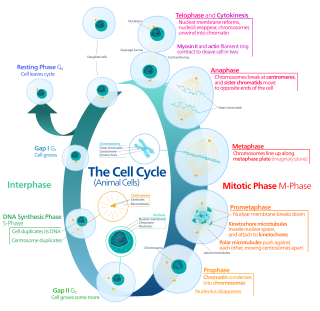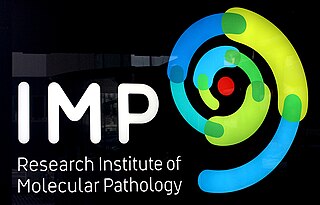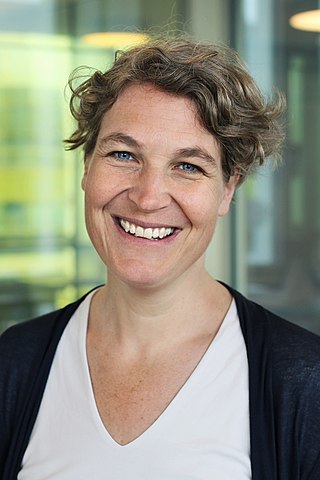Related Research Articles

In cell biology, mitosis is a part of the cell cycle in which replicated chromosomes are separated into two new nuclei. Cell division by mitosis gives rise to genetically identical cells in which the total number of chromosomes is maintained. Therefore, mitosis is also known as equational division. In general, mitosis is preceded by S phase of interphase and is often followed by telophase and cytokinesis; which divides the cytoplasm, organelles and cell membrane of one cell into two new cells containing roughly equal shares of these cellular components. The different stages of mitosis altogether define the mitotic (M) phase of an animal cell cycle—the division of the mother cell into two daughter cells genetically identical to each other.

Kim Ashley Nasmyth is an English geneticist, the Whitley Professor of Biochemistry at the University of Oxford, a Fellow of Trinity College, Oxford, former scientific director of the Research Institute of Molecular Pathology (IMP), and former head of the Department of Biochemistry, University of Oxford. He is best known for his work on the segregation of chromosomes during cell division.

The Research Institute of Molecular Pathology (IMP) is a biomedical research center, which conducts curiosity-driven basic research in the molecular life sciences.

Angelika Amon was an Austrian American molecular and cell biologist, and the Kathleen and Curtis Marble Professor in Cancer Research at the Massachusetts Institute of Technology (MIT) in Cambridge, Massachusetts, United States. Amon's research centered on how chromosomes are regulated, duplicated, and partitioned in the cell cycle. Amon was elected to the American Academy of Arts and Sciences in 2017.

Frank Uhlmann FRS is a group leader at the Francis Crick Institute in London.
William Charles Earnshaw is Professor of Chromosome Dynamics at the University of Edinburgh where he has been a Wellcome Trust Principal Research Fellow since 1996.

Max Luciano Birnstiel was a Swiss molecular biologist who held a number of positions in scientific leadership in Europe, including the chair of the Institute of Molecular Biology at the University of Zurich from 1972–86, and that of founding director of the Research Institute of Molecular Pathology (IMP) in Vienna from 1986 to 1996. His research focused on gene regulation in eukaryotes. His research group is sometimes cited as the first to purify single genes, the ribosomal RNA genes from Xenopus laevis, three years before the successful isolation of the lac operon. He is also recognized for one of the earliest discoveries of a gene enhancer element. Birnstiel died in 2014 of heart failure during cancer treatment.

Thomas Jenuwein is a German scientist working in the fields of epigenetics, chromatin biology, gene regulation and genome function.

The Vienna BioCenter is a cluster of life science research institutes and biotechnology companies located in the 3rd municipal District of Vienna, Austria. It grew around the Research Institute of Molecular Pathology (IMP), which opened in 1988. The entities at the Vienna BioCenter employ more than 2,000 people, including 600 students.
Elly Margaret Tanaka is a biochemist and senior scientist at the Research Institute of Molecular Pathology (IMP) in Vienna, Austria. Tanaka studies the molecular cell biology of limb and spinal cord regeneration as well as the evolution of regeneration.
Hartmut Beug (1945–2011) was a German cancer biologist who studied how groups of oncogenes interact to lead to the development and spread of cancer. Shortly before his death, a foundation was set up in his and his wife’s name to support collaboration among young scientists and their studies in the field of metastasis.
Tim Clausen is a structural biologist and a senior scientist at the Research Institute of Molecular Pathology (IMP) in Vienna, Austria.
Alexander Stark is a biochemist and computational biologist working on the regulation of gene expression in development. He is a senior scientist at the Research Institute of Molecular Pathology (IMP) at the Vienna Biocenter and adjunct professor of the Medical University of Vienna.

Jan O. Korbel is a German scientist working in the fields of Human Genetics, Genomics and Computational Biology. He is a tenured principal investigator and Head of Data Science at the European Molecular Biology Laboratory Heidelberg, Germany, senior scientist in the Genome Biology Unit, is leading a bridging research division at the German Cancer Research Center (DKFZ), and is an honorary professor ("Honorarprofessor") at Heidelberg University. A particular focus of the Korbel group is on investigating a particular form of mutation, genomic structural variation, which includes deletions, inversions and more complex chromosomal rearrangements such as chromothripsis events that can occur in healthy individuals and in context of disease. His group's principal research objective is to understand genomic structural variations as a basis of phenotypic variation and cancer development.
Daniel Wolfram Gerlich is a cell biologist. Since 2012 he has been a Senior Group Leader at the Institute of Molecular Biotechnology (IMBA) of the Austrian Academy of Sciences in Vienna.

Dirk Schübeler is a German researcher, Director of the Friedrich Miescher Institute for Biomedical Research (FMI) and professor at the University of Basel. He is an expert in gene regulation.

Tomo Tanaka FRSE, born in Japan in 1962, is a professor and research scientist based in the Cell and Molecular Biology unit of School of Life Sciences at the University of Dundee, as well as being a Wellcome Trust Principal Research Fellow.

Tim J. Yen is an American molecular biologist and cancer biologist. Yen is currently director of the Biological Imaging Facility at Fox Chase Cancer Center in Philadelphia, Pennsylvania. Yen is known for pioneering work in the field of mitosis.
Juri Rappsilber is a German chemist in the area of mass spectrometry and proteomics.

Andrea Pauli is a developmental biologist and biochemist studying how the egg transitions into an embryo, and more specifically the molecular mechanisms underlying vertebrate fertilisations, egg dormancy, and subsequent egg activation. Her lab uses zebrafish as the main model organism. Andrea Pauli is a group leader at the Research Institute of Molecular Pathology (IMP) at the Vienna Biocenter in Austria.
References
- ↑ "Es kann immer nur einen Entdecker geben". Derstandard.at. Retrieved 21 December 2017.
- 1 2 "Jan-Michael Peters receives Wittgenstein Award 2011" (PDF). Imp.ac.at. Retrieved 21 December 2017.
- ↑ "Jan-Michael Peters wird neuer wissenschaftlicher Leiter am Wiener IMP". Derstandard.at. Retrieved 21 December 2017.
- ↑ Rudolph, D; Impagnatiello, M. A; Blaukopf, C; Sommer, C; Gerlich, D. W; Roth, M; Tontsch-Grunt, U; Wernitznig, A; Savarese, F; Hofmann, M. H; Albrecht, C; Geiselmann, L; Reschke, M; Garin-Chesa, P; Zuber, J; Moll, J; Adolf, G. R; Kraut, N (2015). "Efficacy and mechanism of action of volasertib, a potent and selective inhibitor of Polo-like kinases, in preclinical models of acute myeloid leukemia". Journal of Pharmacology and Experimental Therapeutics. 352 (3): 579–89. doi: 10.1124/jpet.114.221150 . PMID 25576074.
- ↑ Petronczki, M; Lénárt, P; Peters, J. M (2008). "Polo on the Rise-from Mitotic Entry to Cytokinesis with Plk1". Developmental Cell. 14 (5): 646–59. doi: 10.1016/j.devcel.2008.04.014 . PMID 18477449.
- ↑ Klöckner, Lydia (25 August 2013). "Molekularbiologie: Skelett aus Eiweiß-Würmchen hält Chromosomen zusammen". Zeit.de. Retrieved 21 December 2017.
- ↑ "Europäische Kommission : CORDIS : Nachrichten und Veranstaltungen : EuroDYNA leaves healthy genomic research ecosystem as legacy". cordis.europa.eu. Retrieved 21 December 2017.
- ↑ "EuroDyna project". Univie.ac.at. Retrieved 21 December 2017.
- ↑ Pathology, The Research Institute of Molecular. "Press Release: "Lens on Life" – Artists and Scientists Explore Cell Division". Imp.ac.at. Retrieved 21 December 2017.
- ↑ "MitoSys: Systems Biology of Mitosis". Mitosys.org. Retrieved 21 December 2017.
- ↑ "Lens On Life – MitoSys – Artakt". Artakt.co.uk. Retrieved 21 December 2017.
- ↑ "Exhibitions – MitoSys: Systems Biology of Mitosis". Mitosys.org. Retrieved 21 December 2017.